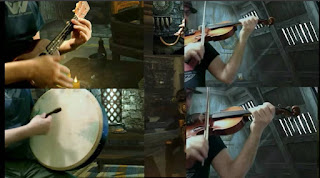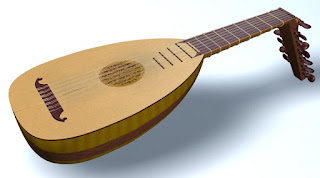I'm still struggling with a lingering cold (sinus headache, frequent coughing) that makes it difficult to concentrate on creative work. So I sit around read. Which is the last thing I need at the moment.
Ideas are easy to come by. Nailing them down and making them work and getting them on paper is hard. I sometimes think writing is easier when you know less. Or as Sam Starfall put it, his lies come easier when he doesn't know what's impossible. The argument here is that of the perfect being the enemy of the good; better to create something, anything, than to wait forever for a perfection that will never come.
So doing more research just leads to more ideas, more directions to explore, more things you might want to fold into the mix. What I really need to do at the moment is un-research.
Speaking of which.
I'm focusing this week on
Uncharted Worlds (the Galaxy Map song). I thought it would be simple. The voicing and arrangement mostly is. But the parts turn out to be more challenging.
The first motif sounds wonderful on the Mini-Hoo. Except that I can't play it at pitch. A lyre isn't fretted, and when I tried to tune the strings up to the proper pitches I snapped the top string. So...I've tuned it a fourth below, will record it that way and pitch-shift it in
Reaper.
The next part in line sounds really wonderful on my Yamaha 3/4 folk guitar. But I can't play that one at tempo. At this point I'm feeling like I'll play it the fastest that still has grace and expression and...fix it in
Reaper.
Might as well give up pretending I could do the thing in concert (as in, play all the parts as written). Which is fine. Instead of carefully trimming a one-bar xylophone until it is at the exact right pitch, I'll just use close enough and tune it digitally. Thing is, the part I'm struggling with isn't even the fastest part. There's a 32nd-note sequence that I could realistically only play on the keyboard.
And, yeah, a nice harpsichord patch would work well acoustically. It sort of breaks the "bardic instrument" thing but I've already introduced chin-cello to the picture. And for this piece, steel-string guitar (acceptable) and electric bass (less so). Maybe I can record it in two takes, playing half the notes each time.
Sigh. And the kid's show (which ended up doing four dress rehearsals -- six hours each in an unheated building. Did I mention I have a cold now?) is apparently not going to pay me until closing night.
Including reimbursing me for the new set of speakers I went out of pocket for. Between show and sick my work hours have suffered so my short-term finances are not happy. Which means despite this being one of the pieces I wanted the Baroque-elele for, this is probably a bad time to drop the cash on that.
And of course I looked at harps again. Remember what I said above about research being easier than concentrating on actually getting stuff done? So...doing the
Goddess Harp as a laser harp is a cute idea but amber laser diodes are...pricey. Really pricey. Besides, my whole quest on acoustic instruments has been because of the inflection they provide. There might be a way of getting more data out of a laser harp so notes sounded different depending on how you air-plucked them, but...
So back to trying to figure out how to do it acoustically. Really acoustically. Now, it has the general shape of a lyre but there's two sticking points; there's no visible tuning pegs, and the trick of a lyre is that the strings run over a bridge which presses on a soundboard (as opposed to a true harp, where the strings are actually anchored
in the soundboard).
Oh, yeah, and I looked at some harp-builder's sites and there's some real interesting math. Here's the thing; your basic "Celtic" harp ends up putting about 900 lbs tension on the frame. You've actually got to engineer the things to take that sort of stress (my Sutton Hoo style lyre, I'd originally tied to the endpin with a doubled length of leather lacing. That snapped and good when I tuned up to pitch).















